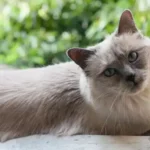Table of Contents
Persian cats are one of the most beloved and recognizable cat breeds, known for their luxurious coats, sweet personalities, and distinctive features. This guide explores the characteristics of Persian cats, including their temperament, physical traits, and care needs.

1. Distinctive Appearance: Characteristics of Persian Cats
Persian cats are renowned for their striking appearance. They have a round face, large, expressive eyes, and a short, snub-nosed profile. Their thick, long fur is perhaps their most defining feature, coming in various colors and patterns.
- Tip: Regular grooming is essential to maintain their beautiful coat and prevent matting. For more information, visit Petfinder.
2. Gentle and Affectionate Temperament
Persian cats are known for their gentle and affectionate nature. They enjoy a calm and quiet environment and are typically very loving towards their owners. Persian cats tend to be less active than other breeds, preferring to lounge and cuddle.
- Tip: Provide a serene and comfortable space for your Persian cat to relax. For more advice, visit Hill’s Pet.
3. Low Energy Levels: Characteristics of Persian Cats
Unlike more energetic breeds, Persian cats are known for their low energy levels. They are not particularly playful but enjoy short bursts of activity followed by long periods of rest.
- Tip: Encourage gentle play with interactive toys to keep your Persian cat mentally stimulated. For more tips, visit Cornell Feline Health Center.
4. High Maintenance Grooming
Due to their long, dense fur, Persian cats require regular grooming to prevent tangles and mats. Daily brushing is recommended to keep their coat in top condition and reduce shedding.
- Tip: Use a metal comb and a slicker brush to gently detangle and maintain your cat’s coat. For more information, visit ASPCA.
5. Prone to Health Issues: Characteristics of Persian Cats
Persian cats are prone to certain health issues, including respiratory problems due to their flat faces (brachycephalic syndrome), dental issues, and kidney disease. Regular veterinary check-ups are crucial to monitor and manage these conditions.
- Tip: Ensure your Persian cat receives regular veterinary care and a balanced diet to support their health. For more advice, visit PetMD.
6. Quiet and Soft-Spoken
Persian cats are generally quiet and soft-spoken. They are not known for being vocal and usually communicate with soft, gentle meows. Their quiet nature makes them ideal for apartments and homes where a calm atmosphere is preferred.
- Tip: Pay attention to your cat’s body language and soft vocalizations to understand their needs. For more tips, visit Hill’s Pet.
7. Adaptable to Indoor Living: Characteristics of Persian Cats
Persian cats thrive in indoor environments. Their low energy levels and preference for quiet, comfortable spaces make them well-suited to indoor living. They are less likely to roam or require outdoor access compared to more active breeds.
- Tip: Provide plenty of cozy spots and vertical spaces like cat trees for your Persian cat to explore and lounge. For more advice, visit Cornell Feline Health Center.
8. Social and People-Oriented
Persian cats are very social and enjoy the company of their human family members. They often form strong bonds with their owners and enjoy being involved in daily activities, often following their favorite people around the house.
- Tip: Spend quality time with your Persian cat to strengthen your bond and keep them happy. For more tips, visit Hill’s Pet.
9. Lifespan and Aging: Characteristics of Persian Cats
Persian cats typically live between 12 to 15 years, although some can live longer with proper care. As they age, they may require more frequent veterinary visits and specialized care to manage age-related health issues.
- Tip: Monitor your senior Persian cat for any changes in behavior, appetite, or mobility. For more advice, visit ASPCA.
Conclusion: Characteristics of Persian Cats
The characteristics of Persian cats make them a unique and beloved breed. Their gentle temperament, striking appearance, and social nature endear them to many cat lovers. By understanding their needs and providing proper care, you can ensure your Persian cat enjoys a happy, healthy life. For more tips on cat care and breeds, visit our website.
Frequently Asked Questions about Persian Cats
What are the grooming needs of Persian cats?
Persian cats require daily grooming to maintain their long, thick fur and prevent matting. Regular baths and professional grooming sessions can also help keep their coat in top condition. For more information, visit Petfinder.
Are Persian cats good with children and other pets?
Persian cats are generally good with children and other pets. Their calm and gentle nature makes them well-suited to family environments, but they prefer a quiet and relaxed atmosphere. For more advice, visit Hill’s Pet.
Do Persian cats have any specific health concerns?
Yes, Persian cats are prone to certain health issues, including respiratory problems, dental issues, and kidney disease. Regular veterinary check-ups are essential to monitor and manage these conditions. For more tips, visit PetMD.
What kind of diet is best for Persian cats?
A balanced diet with high-quality protein and essential nutrients is important for Persian cats. Consult your veterinarian to determine the best diet based on your cat’s age, weight, and health. For more information, visit ASPCA.
How can I keep my Persian cat entertained?
Provide a variety of toys, interactive play sessions, and cozy spots for lounging to keep your Persian cat entertained and mentally stimulated. For more tips, visit Hill’s Pet.











